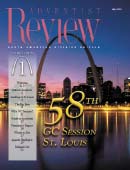 |
||
Throughout the world hundreds of men and women serve in full-time, part-time, or official volunteer chaplain positions; in a number of locations trained chaplain assistants augment their ranks by nearly 1,000. The largest numbers are employed in health-care and educational settings in scores of countries throughout the world. Five or six years ago military and correctional chaplains served only in the United States. Since then military chaplains have been added in Canada, the Czech Republic, Ghana, Kenya, and Malawi; correctional chaplains have been added in Canada, the Czech Republic, and Latvia. Together this global force of crisis ministers takes the gospel into places where the church might not otherwise be present--places like death row, emergency rooms, and battlefields, not to mention great centers of learning. Yearly, many souls are won to Christ and His church, the gospel seed is planted in millions of hearts, and untold goodwill is generated toward the church. In addition, there is the practical benefit of added employment opportunities for ministers with specialized gifts. All of this is done at a very low cost to the church. The church enjoys nearly US$20 million worth of free ministry each year, based on the fact that the majority of Adventist chaplains are remunerated from nonchurch funds. The funding of ACM offices in the divisions of the General Conference is a cost-effective use of tithe monies. Providing support for this ministry are ACM leaders at the General Conference and in nearly every division office; some divisions have union leaders as well. Last year Richard O. Stenbakken retired after 12 years as director of the General Conference Adventist Chaplaincy Ministries Department. Our division ACM leaders or liaison personnel include: Japheth Agboka (West-Central Africa Division); Jonathan Catolico (Southern Asia-Pacific Division); Joshua Dong Hee Shin (Northern Asia-Pacific Division); Eugene Fransch (Southern Africa-Indian Ocean Division); Jochen Hawlitschek (Euro-Africa Division); Anthony Kent (South Pacific Division); Victor Krushenitzky (Euro-Asia Division); Lionel Lyngdoh (Southern Asia Division); Bernardo Rodriguez (Inter-American Division); Tito Rodriguez (South American Division); Orville Woolford (Trans-European Division). Our General Conference ACM Department also provides services within the North American Division. ACM is relatively new, having been created as a General Conference service in 1985 and raised to departmental status in 1995. Thus in 2001 we conducted our second world advisory, with delegates representing 10 divisions in attendance at the General Conference headquarters. After several days of program review and strategic planning, we voted many resolutions. Chief among them were several goals: (1) increased development of chaplaincy and student ministries on public university campuses; (2) expansion of leadership development and policy structures for division ACM programs; (3) development of an organized degree or certificate program for chaplain education; (4) additional resources for chaplains and chaplaincy leaders; (5) continuing education for our chaplains in the area of crisis ministry and communication skills. Since 2001 we have made significant strides toward these goals: I maintain a list of 24 specific services and resources requested
by division ACM leaders and developed by our office that cluster in part around
these major emphases: (1) recruitment and placement of chaplains committed to
Christ and the mission of the church; (2) integrating our chaplains into the
mission of the church; (3) developing chaplains who are professionally competent;
(4) providing organizational support and resources for chaplains, and (5) creating
networking opportunities for fellowship and continued growth among In a sense, ACM is the "trauma ministry" department, helping develop a core of qualified crisis ministers who can respond in the name of the church to events such as the recent Indian Ocean tsunami in Southeast Asia. This past January I responded to an invitation from Jonathan Catolico, ACM director of the Southern Asia-Pacific Division, to conduct four pastoral trauma response and grief ministry workshops for nearly 200 chaplains and pastors in the tsunami-stricken regions of the division. While ACM equipped Adventist ministers for their work, local Adventist Community Service agencies and ADRA International were also engaged in their relief work, joined later by Loma Linda University's trauma response team. It represented the best of Adventist Chaplaincy Ministries and our church--being where the people are, and following Christ's methods of ministry. Send inquiries about ACM, or the ministry of chaplaincy, to
[email protected], or to your division ACM director. |
 |
 |



 hen New York's World Trade Center fell on September 11, 2001,
Adventist Chaplaincy Ministries (ACM) was there to train pastors in grief ministry.
When the first clinical pastoral education training program was needed in South
America, Argentinian chaplain Hugo Portal responded. When the formerly Communist
Czech Republic opened its correctional systems and military to ministry, union
conference leaders authorized the inclusion of Adventist chaplains; in Latvia,
leaders installed correctional chaplains.
hen New York's World Trade Center fell on September 11, 2001,
Adventist Chaplaincy Ministries (ACM) was there to train pastors in grief ministry.
When the first clinical pastoral education training program was needed in South
America, Argentinian chaplain Hugo Portal responded. When the formerly Communist
Czech Republic opened its correctional systems and military to ministry, union
conference leaders authorized the inclusion of Adventist chaplains; in Latvia,
leaders installed correctional chaplains.